Operations Management for the Hospitality Industry
Introduction
Sustainable management is becoming one of the most significant concepts in the hospitality industry because it is one of the most important ways through which the hospitality industry can enhance efficiency while conserving and adopting better technology and initiatives. In this connection, the following report has been structured based on an understanding of operations management issues in the hospitality industry while focusing on sustainability management. Referring to this, several theoretical perspectives will be considered that will offer an in-depth understanding about the required concepts and initiatives that need to be undertaken by the international hospitality industry in terms of improving operation management techniques. Moreover, with sustainable operation management in the hospitality industry can also minimise operating cost along with environmental improvement that leads to competitive advantages. Thus, the following report would focus precisely on the sustainability perspective along with operation management in the hospitality industry with few examples and evidence that can strengthen research interpretation and conclusion.
Discussion and analysis
Hospitality as a system and the role of operations in sustainability management
Referring to the general system theory, the interpretation of interdisciplinary research of systems or unified groups of interconnected, interdependent elements can be organic or manmade. In every system, a casual limit is influenced by the surrounding character to any system rules and expresses its adoption through the interaction with other systems (Pham et al. 2019). Changing one element of a system can have a direct impact on other components of the entire system. Therefore, it can be stated that hospitality is a system that consists of luxury and comfort while identifying in offering better maintenance of customers efficiently. Moreover, in the hospitality industry two systems are primarily essential for the industry such as physical infrastructure that refers to the hard system and human activities that refers to the soft system (Aldianto et al. 2020). This enables the hospitality industry to deliver services and goods to its customers with efficiency.
Sustainability is one of the most significant aspects in the hospitality industry as hotels require water, electricity, goods that are both durable and consumable and leads to creation of waste (Asadi et al. 2020). The waste created in hotels comes out in the form of equipment, furniture, appliances, tubes, bulbs, and others. Thus, the role of operation management is highly influential in the hospitality industry because utilising resources along with efficiently managing the consumer requirements and demand are being successfully addressed by operations management (Szende et al. 2021). Moreover, developing an efficient business management with sustainable practices can efficiently serve the environment along with controlling and maintaining the entire ecosystem. In connection to this, corporate social responsibility theory can be identified, which is the self-regulating business model that allows business organisations to be kind towards the society that includes economic, social, and environmental perspectives (Matten and Spence, 2007).
Therefore, the operations management is required to focus on environmental responsibility, ethical responsibility that can significantly benefit them in terms of brand recognition and efficient risk mitigation. For example, it has been identified that from the conducted survey by Hilton in 2018, 44% of guests that are under 25 years of age are referring to environmental and social practising business hotels while booking rooms (Hotel Tech Report, 2022). Thus, in order to infuse environmental and social practices in the hospitality industry the operation management contributes significantly. Hence, the role of operation management in maintaining sustainability in the hospitality industry is massive.
Technical aspects related to hospitality operations
Sustainability is related to high involvement and leverage of technology aspects that can increase the innovation and creativity in an organisation along with reducing the sense of exploiting natural resources in the environment (Makhloufi et al. 2022). Technology in business operations can help industry to move forward with sustainable solutions and operations in the existing business marketplace. In this connection, it has been identified that technology such as Virtual and Augmented reality (VR and AR), recognition technology, artificial intelligence (AI), internet of things and blockchain technology are the technical aspects that are currently increasing in the hospitality industry. Due to covid-19 impact, augmented reality market size is expected to increase by $198 billion in 2025 and the recognition technology among travellers is highly increasing with 71% (Catala Consulting, 2022). It is more likely to influence capacity planning and management services in the future where faster check in and checkout will be there with reliable payment system security and dematerialised experience. For example, Alibaba’s FlyZoo Hotels are also avoiding traditional check in while influencing with recognition technology (Catala Consulting, 2022).
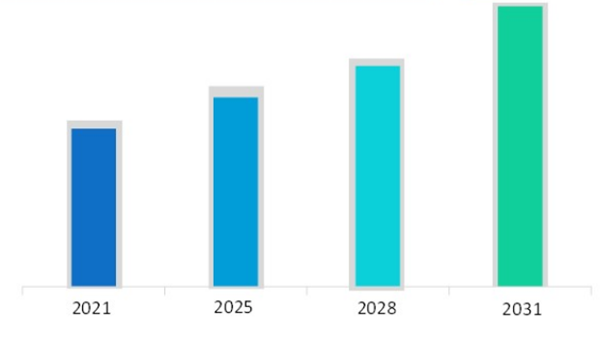
Figure 1: Predicted growth of AI in hospitality industry
(Source: Transparency Market Research, 2022)
Apart from this, artificial intelligence is possibly creating high value across the hospitality industry with $400 billion and impacting over 11.6% of revenue (Catala Consulting, 2022). This is also influencing better visibility of forecasted demand, data analysis, voice control and chat bots. Utilising AI-based methods to accurately forecast can minimise errors in the supply chain of the hospitality industry by 30%-50% (Mitra, 2022). Embracing these techniques could assist organisations throughout all levels in getting precise estimates. Hospitality industries are now generating massive amounts of data about customers, bookings, and others within a short period of time. Therefore, unstructured data accounts for 80%-90% of information while the remaining 70%-75% are being unused (Mitra, 2022). This necessitates powerful computational power and the ability to oversee complexities, such as, AI techniques in the hospitality industry are addressing scalability issues and forecasting the estimates efficiently.
Moreover, the internet of things (IoT) and blockchain technology is also considered to be one of the most significant technical aspects that balance supply and demand along with identifying technological issues while benefiting consumers immensely (Li et al. 2022). Trust of guests offers an impressive approach to hospitality organisation, as the industries are inclining towards offering secure and easy bookings to its consumers. It has been noted that the hospitality industry’s supply chain is based on antiquated ideas, which reflects that it is not transparent that this poor trust and lack of information can emerge (Paliwal et al. 2022). Therefore, blockchain technology is being considered by the hospitality industry to have an open and transparent supply chain while balancing the demands and operations along with tracing the origin of products. Apart from this, blockchain has the possibility to eliminate intermediaries that charge high fees that allow hotels to lower their prices.
Sustainability management in hospitality industry
In the current business environment, it is very essential that the hospitality industry should focus on sustainable practices in the operational management while complying with environmental, social and governance (ESG) principles (Pecunica, 2022). Hotel operators should have a direct interest in promoting sustainable practices toward their low operation cost, protecting reputation of the brand, mitigating demand of guests along with further business continuity. In this connection, it is essential that in order to operate sustainably an organisation require green financing and investment along with improving staff work environment and maintaining assets value (Pecunica, 2022). Apart from this, brand standards and guidelines are required to be primarily centralised with sustainable policies that can create a more sustainable environment in the entire operation process.
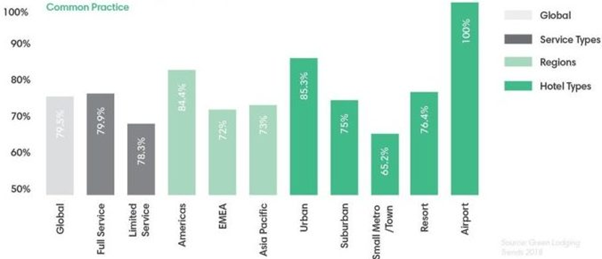
Figure 2: Sustainability globally in hospitality
(Source: Pecunica, 2022)
However, there are several issues in the hospitality industry that can directly impact poor sustainability management and operations. For example, water consumption is a major issue where long guest showers and large swimming pools with a lot of water are a waste of natural resources (Achmad and Yulianah, 2022). Along with this, restaurants use water for cleaning dishes and machines are often inefficient in terms of conserving water. Furthermore, energy consumption also has an impact on hospitality organisations as this includes resort electricity, hotels, tourism, and other businesses. Nevertheless, food waste is identified the most in the hospitality industry that causes major environmental issues and lead to high unsustainability in the organisational operation and society (Kasavan et al. 2022). It has been identified that in hotels to 289,700 of food waste are being produced each year that includes 790,000 tons of food waste that is 9% of total waste of food in the sector (Guenn Tayao, 2022).
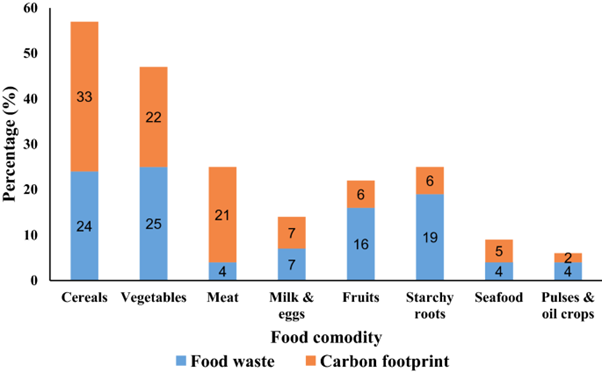
Figure 3: Food waste and carbon footprint in hospitality industry
(Source: Gandhi et al. 2020)
Pollution is another problem in the hospitality industry that is increasingly growing and distributing the sustainable operations in the industry. Whenever there is a high output of oil and gas, petroleum products, fuel, and coal; pollution automatically increases, impacting the sustainable management of the company (Xiong and Xu, 2021). Whether these are being utilised for the energy or public transit the pollution caused by the hospitality organisation is very significant. Apart from this, garbage and waste are another important aspect and issue in operation management while focusing on sustainability, as it clogs the environment and generates waste (Kumar et al. 2021). Everything from the cups, plastic, and cooperation printed initiative can create a high amount of waste generation, which can pollute the environment and disrupt the entire sustainable operation management. It has been noted that 70% of businesses are currently looking to cut down single use plastic and water bottles due to high wastage in the hospitality industry (Open Access Government, 2018). Hence, it can be stated that there are several issues and challenges in sustainable operations management in the hospitality industry, which requires more attention from the organisations operating in the sector.
Analysing operations management techniques used in the international hospitality industry
The hospitality industry is distinctively exposed to environmental damage because it is dependent on a better and healthier global ecosystem. In the year of 2019, a survey of airlines and global hotel chains has demonstrated that a list of top considerations that are regarding the consequence of climate change on the future business, where luxury hospitality organisations such as Hilton, Accor, Hyatt, Indian hotels, Scandic and Marriott existed (Insights eHotelier, 2021). Moreover, in 2019, 71% of individuals considered that climate is the most important decision that needs to be considered on time (Insights eHotelier, 2021). Moreover, 78% of people felt that brands are required to focus on climatic aspects and environmental sustainability (Insights eHotelier, 2021). From this purpose, it can be stated that the operational management techniques that are specifically revolving in the international hospitality industry refers to sustainable operation and better technological adoption.
Additionally, service scheduling could be either planned or unplanned, where guests may need to make reservations for their dining, but they visit fast-food restaurants at any time. Referring to this, there are two basic scheduling techniques utilised by the hospitality industry such a Critical Path Method (CPM) and Program Evaluation Review Technique (PERT) (Abbasi et al. 2020). On the other hand, overbooking is also one of the concerns that require better strategy to handle. It has been noted that hotels allowed this overbooking because they expect that guests will cancel at a certain period. However, sometimes it leads to disadvantages such as potential poor publicity, negative guest experience and confusions in the reception (Rakesh et al. 2022). In terms of revenue management techniques, the international hospitality industry focuses on their hotel pricing strategy. For example, it has been acknowledged that Hilton has announced a new pricing structure for the organisation with “customer-centric pricing strategy,” which refers to driving the commitment with the corporation while managing the hotel programs effectively along with benefiting the yield management practices (FCM, 2018).
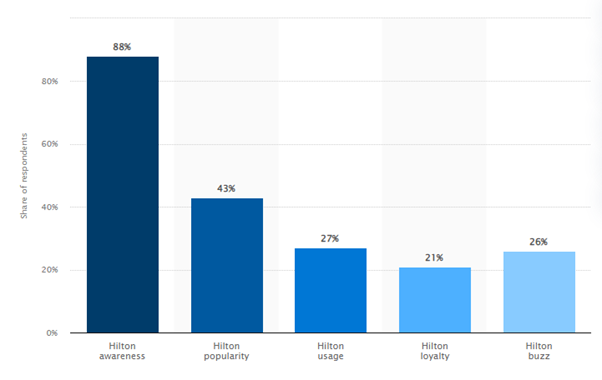
Figure 4: Hilton performance among consumers
(Source: Kunst, 2022)
Furthermore, in terms of queuing and simulation technology is highly influencing the hospitality industry with online services and contact list check-ins. With the support of technology such as AI, blockchain, virtual reality and many others that makes the entire customer journey efficient and seamless (Jiang, 2022).
Impact made by productivity and performance
Hospitality industry is operating based on service offerings to its respective consumers. With the support of sustainability and conversion data, it has been identified that Marriott plans to remove all of the single-used toiletries from the properties, which has saved around $14 million each year. This indicates that with the support of sustainable approaches the impact of hotels on their performance and service offerings is respectively high, as it has been noted that 53% of consumers wanted to travel sustainably in future trips. Apart from this, Choice Hotels are also committed to cage free eggs with 100% in the company properties by the year 2025 (Hotel Tech Report, 2022). With this sustainable service offerings have impacted immensely on Choice Hotels performance and market capitalisation, as it has increased 46.61% from $5.91 billion to $8.67 billion in 2021 (Market Cap, 2022).
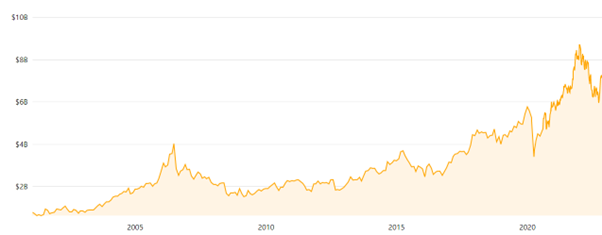
Figure 5: Choice Hotels market capitalisation
(Source: Market Cap, 2022)
While referring to the quality services, it also includes how hospitality organisations are committed to sustainable practices and improving the condition of society. Referring to this, as a part of RiseHY program, Hyatt has been committed to hiring 10,000 youth between the age 16 to 24 by the year 2025 (Hotel Tech Report, 2022). This initiative has increased the revenue of Hyatt Hotels while generating $3.03 billion in the year 2021, which was earlier $2.07 billion in 2019 (Lock, 2022). Moreover, another hotel named as Wyndham hotel and resort has emphasised on incorporating gender equity in executive pay, which ultimately improves the quality of living of individuals that are operating in the organisation (Hotel Tech Report, 2022). This aspect has significantly improved the annual revenue of Wyndham hotel and resort by 20.38% in the year 2020 with $1.565 billion (Macro Trends, 2022).
With this perspective, triple bottom line theory can be incorporated as it refers to the maintenance of commitment towards social and environmental concerns while improving profit of the organisation (Lopez-Cabrales and Valle-Cabrera, 2020). From the understanding of the impact of productivity and performance of services offered by the hospitality industry, it can be stated that hotels such as Hyatt, Marriott, Wyndham hotel and resort are extensively focusing on maintaining a better environment. Along with this, they are also focusing on social perspective by influencing better living standards that is undoubtedly influencing their economic condition with high revenue and brand value.
Conclusion
Based on the above understanding, it can be stated that there are several sustainability management practices existing in the hospitality industry and they are managing it with the support of technology and better initiative. However, there are few challenges that have been identified such as excessive water and energy consumption, excessive food waste and pollution. Moreover, it has also been noted that the role of operational management is highly influential in the hospitality industry along with a sustainable perspective, as it allows business organisations to improve better while operating successfully. Additionally, the consumers are also focusing on sustainable practices and want to be sustainable. Furthermore, technologies such as blockchain, augmented and virtual reality, artificial intelligence, internet of things has been considered as the primary role in addressing the technical aspect of hospitality operations with a successful note.
Reference list
Abbasi, S., Taghizade, K. and Noorzai, E., 2020. BIM-based combination of takt time and discrete event simulation for implementing just in time in construction scheduling under constraints. Journal of construction engineering and management, 146(12), p.04020143.
Achmad, W. and Yulianah, Y., 2022. Corporate Social Responsibility of the Hospitality Industry in Realizing Sustainable Tourism Development. Enrichment: Journal of Management, 12(2), pp.1610-1616.
Aldianto, L., Novani, S., Anggadwita, G., Budi, A.A. and Wirawan, C., 2020. Soft system methodology approach: tourism conceptual model as the identity of Bandung, Indonesia. Business: Theory and Practice, 21(1), pp.282-292.
Asadi, S., Pourhashemi, S.O., Nilashi, M., Abdullah, R., Samad, S., Yadegaridehkordi, E., Aljojo, N. and Razali, N.S., 2020. Investigating influence of green innovation on sustainability performance: A case on Malaysian hotel industry. Journal of cleaner production, 258, p.120860.
Catala Consulting, 2022. 4 New Technologies Emerging in the Hospitality Industry Today. [online] Available at: <https://catalaconsulting.co.uk/key-technologies-hospitality-industry/> [Accessed 4 November 2022]
FCM, 2018. Hilton’s new pricing structure will see corporates pay for flexibility. [online] Available at: <https://www.fcmtravel.com/en-za/resource-centre/travel-news/hiltons-new-pricing-structure-will-see-corporates-pay-flexibility> [Accessed 4 November 2022]
Gandhi, P., Yadav, M., Paritosh, K., Pareek, N., Lizasoain, J., Bauer, A. and Vivekanand, V., 2020. Food wastes from hospitality sector as versatile bioresources for bio-products: an overview. Journal of Material Cycles and Waste Management, 22(4), pp.955-964.
Guenn Tayao, I. 2022. Waste Management In The Hospitality Industry. [online] Available at: <https://waster.com.au/waste-management-hospitality-industry/> [Accessed 4 November 2022]
Hotel Tech Report, 2022. Hotel Sustainability: 27 Statistics Illustrating the Growth of ESG in the Hotel Industry. [online] Available at: <https://hoteltechreport.com/news/hotel-sustainability-statistics> [Accessed 4 November 2022]
Insights eHotelier, 2021. Why sustainability in the hospitality industry must be our top priority. [online] Available at: <https://insights.ehotelier.com/insights/2021/05/19/why-sustainability-in-the-hospitality-industry-must-be-our-top-priority/> [Accessed 4 November 2022]
Jiang, H., 2022. Research on Hotel Management Based on Internet of Things and Big Data Analysis. International Journal of Reliability, Quality and Safety Engineering, p.2240004.
Kasavan, S., Siron, R., Yusoff, S. and Fakri, M.F.R., 2022. Drivers of food waste generation and best practice towards sustainable food waste management in the hotel sector: a systematic review. Environmental Science and Pollution Research, pp.1-16.
Kumar, R., Verma, A., Shome, A., Sinha, R., Sinha, S., Jha, P.K., Kumar, R., Kumar, P., Das, S., Sharma, P. and Vara Prasad, P.V., 2021. Impacts of plastic pollution on ecosystem services, sustainable development goals, and need to focus on circular economy and policy interventions. Sustainability, 13(17), p.9963.
Kunst, A. 2022. Hilton brand awareness, usage, popularity, loyalty, and buzz among hotel customers in the United States in 2022. [online] Available at: <https://www.statista.com/forecasts/1335754/hilton-hotels-brand-profile-in-the-united-states> [Accessed 4 November 2022]
Li, J., Herdem, M.S., Nathwani, J. and Wen, J.Z., 2022. Methods and Applications for Artificial Intelligence, Big Data, Internet-of-Things, and Blockchain in Smart Energy Management. Energy and AI, p.100208.
Lock, S. 2022. Revenue of Hyatt Hotels Corporation worldwide from 2008 to 2021. [online] Available at: <https://www.statista.com/statistics/257362/revenue-of-the-hyatt-hotels-corporation/> [Accessed 4 November 2022]
Lopez-Cabrales, A. and Valle-Cabrera, R., 2020. Sustainable HRM strategies and employment relationships as drivers of the triple bottom line. Human resource management review, 30(3), p.100689.
Macro Trends, 2022. Wyndham Hotels & Resorts Revenue 2016-2022 | WH. [online] Available at: <https://www.macrotrends.net/stocks/charts/WH/wyndham-hotels-resorts/revenue> [Accessed 4 November 2022]
Makhloufi, L., Laghouag, A.A., Meirun, T. and Belaid, F., 2022. Impact of green entrepreneurship orientation on environmental performance: The natural resource‐based view and environmental policy perspective. Business Strategy and the Environment, 31(1), pp.425-444.
Market Cap, 2022. Market capitalization of Choice Hotels International (CHH). [online] Available at: <https://companiesmarketcap.com/choice-hotels-international/marketcap/> [Accessed 4 November 2022]
Matten, D. and Spence, L., eds., 2007. Corporate social responsibility: readings and cases in a global context. London: Routledge.
Mitra, I., 2022. Council Post: AI powered solution – the next best option for demand forecasting. [online] Available at: <https://analyticsindiamag.com/ai-powered-solution-the-next-best-option-for-demand-forecasting/#:~:text=methods%20are%20manifold.-,According%20to%20Mckinsey%2C%20forecasting%20demand%20with%20the%20help%20of%20AI,that%20might%20impact%20the%20demand.> [Accessed 4 November 2022]
Open Access Government, 2018. The hospitality industry’s relationship with waste. [online] Available at: <https://www.openaccessgovernment.org/hospitality-industry-waste/51174/> [Accessed 4 November 2022]
Paliwal, V., Chandra, S. and Sharma, S., 2020. Blockchain technology for sustainable supply chain management: A systematic literature review and a classification framework. Sustainability, 12(18), p.7638.
Pecunica, 2022. What is sustainable hospitality?. [online] Available at: <https://pecunica.com/knowledge-point/what-is-sustainable-hospitality/> [Accessed 4 November 2022]
Pham, N.T., Tučková, Z. and Jabbour, C.J.C., 2019. Greening the hospitality industry: How do green human resource management practices influence organizational citizenship behavior in hotels? A mixed-methods study. Tourism Management, 72, pp.386-399.
Rakesh, M.V., Kumar, S.P. and Aishwarya, R., 2022, February. Hotel Booking Cancelation Prediction using ML algorithms. In 2022 Second International Conference on Artificial Intelligence and Smart Energy (ICAIS) (pp. 466-471). IEEE.
Szende, P., Dalton, A.N. and Yoo, M. eds., 2021. Operations management in the hospitality industry. Bingley: Emerald Publishing Limited.
Transparency Market Research, 2022. AI in Travel and Hospitality Market. [online] Available at: <https://www.transparencymarketresearch.com/ai-in-travel-and-hospitality-market.html> [Accessed 4 November 2022]
Xiong, J. and Xu, D., 2021. Relationship between energy consumption, economic growth, and environmental pollution in China. Environmental Research, 194, p.110718.
Know more about UniqueSubmission’s other writing services:

